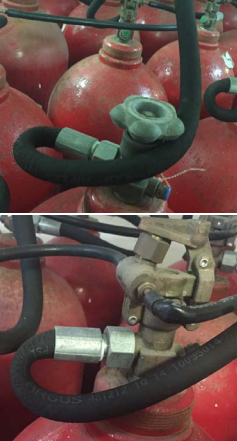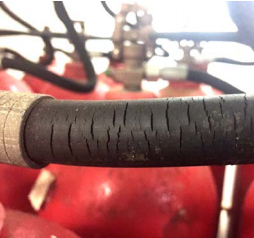Fixed CO2 fire extinguishing systems – US Coast Guard alert
What happened
The United States Coast Guard (USCG) has published Safety Alert 13-17 relating to Fixed CO2 fire extinguishing systems. This alert follows discovery of critical deficiencies in the fixed firefighting equipment on a container ship. The conditions associated with the onboard CO2 system may have prevented the system from operating correctly or, if not discovered, the system may not have operated at all in an emergency situation.


What went wrong? What were the causes?
During the inspection, it was noted that some of the hoses which connected the large CO2 cylinders to the manifolds were wrapped around the bottle valve handles (as shown in the accompanying photographs). The bottles could have been in place for a long period of time, in their original positions without regard to the stresses placed on the connecting hoses.
Inspectors also found significant cracking of the CO2 discharge hoses which were under tension (see photograph). This condition is known as ozone cracking and occurs when very small amounts of ozone in the atmosphere interact with the polymers that compose rubber products and certain other elastomers when those products are under tension.
Lessons learnt
The USCG notes that IMO has published MSC.1/Cir.1318, “Guidelines For The Maintenance and Inspections of Fixed Carbon Dioxide Fire extinguishing Systems“. This provides the minimum recommended level of maintenance and inspections for fixed carbon dioxide fire-extinguishing systems on all ships in order to demonstrate that the system is kept in good working order, as specified in SOLAS regulation II2/14.2.1.2. In addition to other important information, it provides useful maintenance and inspection guidance.
Safety Event
Published: 31 January 2018
Download: IMCA SF 03/18
IMCA Safety Flashes
Submit a Report
IMCA Safety Flashes summarise key safety matters and incidents, allowing lessons to be more easily learnt for the benefit of all. The effectiveness of the IMCA Safety Flash system depends on Members sharing information and so avoiding repeat incidents. Please consider adding [email protected] to your internal distribution list for safety alerts or manually submitting information on incidents you consider may be relevant. All information is anonymised or sanitised, as appropriate.
IMCA’s store terms and conditions (https://www.imca-int.com/legal-notices/terms/) apply to all downloads from IMCA’s website, including this document.
IMCA makes every effort to ensure the accuracy and reliability of the data contained in the documents it publishes, but IMCA shall not be liable for any guidance and/or recommendation and/or statement herein contained. The information contained in this document does not fulfil or replace any individual’s or Member's legal, regulatory or other duties or obligations in respect of their operations. Individuals and Members remain solely responsible for the safe, lawful and proper conduct of their operations.
